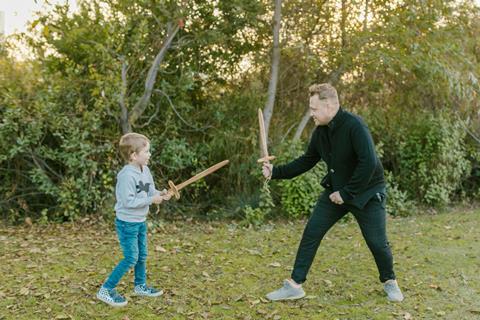Our young people are being exposed to increasingly violent language, but are the songs we sing in church helping? Michael J Tinker provides Christian parents with food for thought

The horrific killing of Charlie Kirk has highlighted what turbulent times we live in. I’ve been struck by how much ‘fighting talk’ from all sides is floating around the internet and what especially concerns me is the proximity of that language to declarations of ‘Christ is King’. How do we parents help our children navigate this confusing time, standing firm in the faith with conviction and grace?
There’s much that has been said on this topic, but as a songwriter I want to take a look at the songs we sing in church. This might seem a strange thing to do - surely they are all about the gospel of peace? Well, yes… and no.
If you’re of a particular generation you may remember singing:
I may never march in the infantry
Ride with the cavalry
Shoot the artillery…
But I’m in the Lord’s army!
I LOVED this song as a kid - getting to sing about Jesus AND do shooting actions?!
Fast forward to 9/11 and militaristic Christian songs fell out of favour. The caution in regards to these songs was wise in my opinion - for many this was the first time we had seen religious extremists using violence to further their beliefs. In this context we had to ask ‘what do people hear when we sing about being Christian soldiers?’
The full armour of God (Ephesians 6:10-18) includes feet ready with the gospel of peace
Spiritual warfare is talked about in the New Testament, but it is never to involve physical violence. Quite the opposite. The full armour of God (Ephesians 6:10-18) includes feet ready with the gospel of peace. Jesus teaches us to love our enemies and pray for them (Matthew 5:44), to turn the other cheek (Matthew 5:39). He tells his disciples that those who live by the sword die by the sword (Matthew 26:52) shortly before winning the greatest victory over evil, not by waging a physical war, but by laying down his life. Indeed much of the language is defensive (e.g. ‘stand firm’) rather than offensive. We preach the truth - Jesus wins the battle. In the 90’s we could sing these old songs about being ‘in the Lord’s army’ because we had this biblical background.
And this is how songs function. A good song is a short message that immediately resonates with the hearers because there is a foundation of shared understanding. There’s no time in a song to give much back story and so ambiguity can ruin a good congregational song.
But what happens when there’s not that shared biblical foundation? Suddenly these words are hijacked for ends that they were never intended.
I think we’ve seen a number of examples of that recently. As Premier reported at the ‘Unite the Kingdom’ rally in London, which attracted a staggering c.150,000 people, the crowd were chanting “Jesus is King” and publicly reciting the Lord’s prayer. The same thing happened at a vigil for Charlie Kirk the night before. On the face of it, this seems something to celebrate.
However, Nick Tenconi, COO of Turning Point UK and a professing Christian, told a crowd at the vigil that “turn the other cheek is over” and we should be “radicalised”. They seemingly could declare the Lordship of Jesus AND ignore his words. The next day Elon Musk came on screen and declared “fight or you will die”. Here we have two events where ‘Christianity’ is mixed with overt calls for violence. This is all in the context of the killing of Charlie Kirk, which has been surrounded by calls to ‘fight’ in the USA. Indeed, Charlie himself, while being so kind and generous to many adversaries in his interactions, also called for Joe Biden to face the death penalty and for executions to be televised saying on his podcast ”I would totally tune in to see some pedo get their head chopped off”.
we must be clear that the Bible turns the world’s understanding of fighting on its head
Ok - so the rhetoric at rallies and in social media posts is concerning, but what’s this got to do with church songs, especially since we long ago jettisoned ‘I’m in the Lord’s Army’? Well, it appears songs that use militaristic or even violent language are perhaps back. In the song ‘Praise’ by Elevation Worship a line goes ‘Praise is the waters my enemies drown in’. This song is #3 in the CCLI top 100 which means it is being sung by thousands of churches around the world. During the live video this particular line is met with cheers from the congregation. I’ve heard solid biblical Christians sing this song seemingly without any concern.
I think this is a prime example of a song that is making far too many assumptions of the audience’s understanding and so opens itself to be dangerously misapplied. For instance, the writers assume that we have a shared understanding of who our ‘enemies’ are (and are ‘mine’ the same as yours?!) and what ‘drowning’ them with our praise means, and indeed why we would even want to do that. I’ve no doubt that the authors intend this in a non-violent way but even I, as a 42 year old man who has been trained in theology, am left scratching my head, trying to backfill meaning into that lyric. I do so assuming the best, but what if our young people have been imbibing the violent language calling us to rise up against our ‘enemies’? What about visiting non-Christian youth? How will they understand such a line?
I think there are some things as parents and youth leaders that we can do to help our young people navigate this confusing time with godliness.
1. Be careful what we sing in church
We need to understand what we are singing so if you have to jump through theological hoops to explain a lyric then I would encourage you to ditch the song. It’s not worth it, especially as our youth may not have the theological wherewithal to jump through those hoops. Also, it’s probably an indication of poor songwriting, theologically speaking (just because they’re famous doesn’t make them good theologians). The song may get us jumping and have some good lyrics, but that doesn’t mean it’s worth risking bad theology on our kids.
2. Think about what non-christians are ‘hearing’ when we sing our songs
Does it lead them to believe we love our neighbours and pray for our enemies? Or do we look like we want the violent downfall of those who are not one of ‘us’? Perception does matter.
Read more:
The Bible’s too violent for children - we need to ban it!
Knife Crime: What parents need to know and what they can do
3. Explain what we sing in church
It might be that there are some lines that are a little obscure but are still worth singing (for instance in ‘Come O Fount’ the lyric about the Ebenezer needs explaining, but I think it’s worth it). In which case make sure you explain it. Give the back story before they fill it in for themselves. Don’t assume they know.
4. Make sure that our young people understand how the Bible expects us to wage spiritual warfare
This article isn’t a call to avoid any fighting talk. The Bible is full of it. But we must be clear that the Bible turns the world’s understanding of fighting on its head. Teach the full armour of God (and don’t just state that we need to put it on). Show how radically different Christian warfare is to extreme Islam or far-right/far-left agitators. Show how Jesus calls us to stand firm on truth but that that truth is a gospel of peace between those who were enemies (Ephesians 2:14). In being God-like we lay down our lives rather than taking others’. We want our enemies to end up praising God (1 Peter 2:12).
We do need fighting talk, but in a world where Christian language is being conflated with calls for violence we need to be very careful how we do that. We can start by being careful what we sing.


































